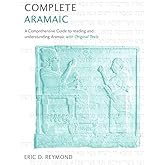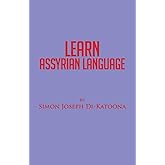
Download the free Kindle app and start reading Kindle books instantly on your smartphone, tablet, or computer - no Kindle device required.
Read instantly on your browser with Kindle for Web.
Using your mobile phone camera - scan the code below and download the Kindle app.

Modern Aramaic-English/English-Modern Aramaic Dictionary & Phrasebook: Assyrian/Syriac Paperback – Illustrated, June 1, 2007
- Print length300 pages
- LanguageEnglish
- PublisherHippocrene Books
- Publication dateJune 1, 2007
- Dimensions3.25 x 1 x 7.25 inches
- ISBN-100781810876
- ISBN-13978-0781810876
Book recommendations, author interviews, editors' picks, and more. Read it now
Customers who viewed this item also viewed
Product details
- Publisher : Hippocrene Books; Bilingual edition (June 1, 2007)
- Language : English
- Paperback : 300 pages
- ISBN-10 : 0781810876
- ISBN-13 : 978-0781810876
- Item Weight : 2.31 pounds
- Dimensions : 3.25 x 1 x 7.25 inches
- Best Sellers Rank: #887,782 in Books (See Top 100 in Books)
- #1,145 in Dictionaries (Books)
- #1,858 in Foreign Dictionaries & Thesauruses
- #2,371 in Foreign Language Instruction (Books)
- Customer Reviews:
About the author

Discover more of the author’s books, see similar authors, read book recommendations and more.
Customer reviews
Customer Reviews, including Product Star Ratings help customers to learn more about the product and decide whether it is the right product for them.
To calculate the overall star rating and percentage breakdown by star, we don’t use a simple average. Instead, our system considers things like how recent a review is and if the reviewer bought the item on Amazon. It also analyzed reviews to verify trustworthiness.
Learn more how customers reviews work on AmazonTop reviews from the United States
There was a problem filtering reviews. Please reload the page.
- Reviewed in the United States on June 27, 2011As described in the title, the book is a combination dictionary and phrasebook which covers two contemporary spoken Aramaic dialects, the Turoyo dialect from the Tur-Abdin area of Turkey, and the Mesopotamian-Lake Urmia Swadaya ('colloquial') dialect originally based in Northern Iraq and adjacent areas of Iran. The two dialects seem to be markedly different from one another, but luckily some of the differences fall into regular patterns (for 'hello' Turoyo says "shlomo" and Swadaya says "shlama"). The authors do a good job of integrating the two dialects in the book.
There is a readable, short, historical overview of the sometimes tragic experiences of the language's speakers, generally known as Assyrians or Chaldeans, and a helpful grammar summary that helps you make mores sense of the questions and answers you read in the phrasebook sections. The grammar summary would be more helpful if it had a table showing the full conjugations of half a dozen key verbs and a few sentences explaining the overall pattern (the grammar summary in the Lonely Planet Amharic book is a good example of what I think is ideal).
The striking thing about the phrasebook sections are the number of phrases related to war: "Please show me the minefields" is one of the sentences that caught my attention. I suppose this is a sad commentary on the experiences of people in Iraqi Kurdistan in recent times. I wonder whether a major part of the book's intended audience is the military (I had assumed it would have been mainly the Assyrian-Chaldean ethnic community and some curious individuals interested in Semitic languages, like myself).
I wish, in addition to an expanded grammar section, there was more use of the Eastern or "Nestorian" version of the Syriac script. The authors did present it in a short section, for which I'm grateful, but I would have liked some short texts in the script, as well (perhaps in the dictionary section), even just three of four examples of printed modern Aramaic. I suppose when the script is used the temptation arises to use the classical Syriac form of a word instead of the modern colloquial.
All in all, a fascinating and valuable book. I hope a recorded version is next.
- Reviewed in the United States on November 8, 2013This small book is the best (and only) publication available for those who would like to acquire some spoken Aramaic without struggling through the process of learning the Syriac/Hebrew alphabet. It accomodates the needs of diverse learners because it covers simultaneously the two leading Aramaic modern dialects. It also dispenses with the need for profound grammar study and memorization since its focus is on practical and rapid verbal communication. The entire book is transliterated leaving the student only with the task of studying and memorizing the sentences and or/vocabulary he/she thinks will be needed most.
This is not a book designed to make a person "fluent" in any of the Aramaic modern dialects, but it enables a diligent sutudent to function on the level of basic communcation; it also enables a person who likes to get deeper into modern Aramaic to have a good starting point. The price of this book is very reasonable and the authors are to be commended for the effort they made to allow persons access to this fascinating language.
- Reviewed in the United States on October 4, 2023EXCELLENT
- Reviewed in the United States on August 19, 2011This is a useful dictionary of two varieties of an important living Semitic language. It has lots of words, all written Romanized, so one does not need to learn any native alphabet to read them. But the 3 alphabets are presented too. One problem with the dictionary is the nouns do not have the gender shown, so that makes it harder to create new sentences. But the phrasebook section has plenty of sentences. There is also some cultural information, and especially a good section on the history of the Assyrians. They sure had some tragic centuries, persecuted by pagans, Zoroastrians, Catholics, then Muslims, in particular the genocides by Tamerlane, and then during WWI, I knew about the Armenian genocide but now I see the Ottomans massacred Assyrians too, almost a million. Though not all the info is reliable, the book claims king Abgar corresponded with Jesus himself, but modern scholars think Abgar's letter and Jesus's reply are fake, not from first century. Another error is the claim that Jews of Jesus's time spoke Aramaic, not Hebrew, but in reality a few still spoke Hebrew as their native language and learned Aramaic as a second language. But other info seems reliable from what I have found elsewhere.
- Reviewed in the United States on April 6, 2021I am really impressed with this and would recommend to all those who want to learn and keep the Aramaic dialect from dying.
Top reviews from other countries
-
 KatjaReviewed in Germany on February 23, 2018
KatjaReviewed in Germany on February 23, 20185.0 out of 5 stars Ein sehr gutes Lernbuch indem man zwei Dialekte erlernen kann:)
Ich war lange schon auf der Suche nach einem geeigneten Buch, in dem man den West Dialekt erlernen kann. Somit habe ich mir dieses Buch bestellt das ich super geeignet dafür finde:) Ein Pluspunkt bekommt dieses Buch weil man zusätzlich noch den Ost Dialekt erlernen kann falls man diesen nicht spricht und gerne erlernen möchte:)
 Ich war lange schon auf der Suche nach einem geeigneten Buch, in dem man den West Dialekt erlernen kann. Somit habe ich mir dieses Buch bestellt das ich super geeignet dafür finde:) Ein Pluspunkt bekommt dieses Buch weil man zusätzlich noch den Ost Dialekt erlernen kann falls man diesen nicht spricht und gerne erlernen möchte:)5.0 out of 5 stars
Ich war lange schon auf der Suche nach einem geeigneten Buch, in dem man den West Dialekt erlernen kann. Somit habe ich mir dieses Buch bestellt das ich super geeignet dafür finde:) Ein Pluspunkt bekommt dieses Buch weil man zusätzlich noch den Ost Dialekt erlernen kann falls man diesen nicht spricht und gerne erlernen möchte:)5.0 out of 5 stars Katja
KatjaEin sehr gutes Lernbuch indem man zwei Dialekte erlernen kann:)
Reviewed in Germany on February 23, 2018
Images in this review
 Santiago R.Reviewed in the United Kingdom on March 29, 2025
Santiago R.Reviewed in the United Kingdom on March 29, 20255.0 out of 5 stars Good book to deep in the Aramaic Language and Dialects
Good book to deep in the Aramaic Language and Dialects
 CibeleReviewed in Brazil on February 12, 2022
CibeleReviewed in Brazil on February 12, 20225.0 out of 5 stars Great dictionary
a functional support tool for better use of the Aramaic language.
 Tawer DanielReviewed in Canada on April 5, 2024
Tawer DanielReviewed in Canada on April 5, 20245.0 out of 5 stars Amazing Resource
As one who rarely writes reviews, I thought it was important to honor the work that was put into this book. I'm an Assyrian who has allowed his language to falter, slightly, as English has become the dominant tongue. It was a goal of mine this year to learn to read, write, and speak fluently and expand my Assyrian vocabulary considerably.
This is an amazing resource to help with that journey. The care and accuracy which has been put into this book is deeply commendable. Although it may be difficult to capture the different dialects that each tribe places on the language, this book does an amazing job providing the reader what they need to learn the language.
A tip of the hat to all involved in putting this together. My thanks.
 KateReviewed in Australia on February 15, 2024
KateReviewed in Australia on February 15, 20245.0 out of 5 stars Good book
Very helpful
Very useful and good book everything I wanted thank you seller















